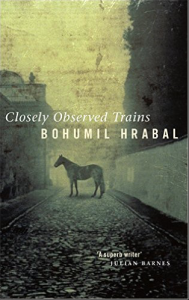
Published in 1965, Bohumil Hrabal’s Closely Observed Trains – Ostře sledované vlaky, was one of the author’s greatest successes and has even been made into a movie. Hrabal wrote a first version of this book, which was more radical but had no chance of getting published. While this second version still contains a lot of what was unacceptable in Czechoslovakia at the time – the depiction of unheroic death and sex – by the time it was published, the public was ready and embraced Hrabal’s irreverent tale, in which sex ultimately leads to a young man’s demise.
Closely Observed Trains tells the story of a young man, Milos Hrama, who is an apprentice at a train station. Milos is back at work after three months of sick leave. He tried to kill himself after failing in bed with his girlfriend. He’s still a virgin and afraid that if he has a second chance with his girlfriend, the result will be the same.
It’s the end of the war and the Germans are slowly being defeated. But still trains from and to the Eastern front arrive at the small but strategically important station. Trains that transport wounded soldiers, maimed cattle, animals on their way to the slaughterhouse. Some of this is described quite graphically. I even had to put dow the book a few times.
The little station has been the scene of a scandal. One of the employees, dispatcher Hubicka, used the official stamps and applied them to the naked bottom of a beautiful telegraphist. The story has made the rounds and people come to have a look at the audacious Hubicka. Many are scandalised, but many more admire him for his gutsy behavior. The station master pretends he’s shocked, but he’s too involved with his own life to really care. He’s busy climbing the social ladder, licking asses, caring for his beloved pigeons, and shouting at people.
All this fascinates Milos whose over sexed imagination is combined with the fear of failing again in the future. In many comic scenes he tries to talk about his fears to different people.
The sexual aspects of the novel are in many instances hilarious, but the book is still very serious. Some of the humor is used to ridicule collaborators and the Germans themselves aren’t spared. There’s no empathy for the enemy. Towards the end, when Dresden is bombed, one of the character’s laconic comment to a wounded German soldier, “You should have stayed home, shouldn’t you?”, is quoted again.
The most striking aspect of the book is that it combines scenes of horror and humor and in doing so achieves a distortion that gives the story an absurd feel. It’s as if the war wasn’t taken seriously, not because the people don’t get how serious it is but as an act of defiance. It’s as if the characters were saying to the Germans—you may think you defeated us – think again – you failed because we refuse to take you and your war seriously.
I enjoyed reading this book a great deal. It reminded me of some Czech movies I’ve seen during a Czech movie festival. Many of them used the same type of humor. It’s a mix of the absurd and the burlesque. Exaggerations, tall tales. At times this humor is close to slapstick but always stops right before turning into this cruder humor. It’s the behaviour, the attitude of the people that’s funny. They aren’t goofs, they are eccentrics.
I expected a lot from this slim novel and am happy to say – I wasn’t disappointed.
Other Reviews
*******
Closely Observed Trains is the third book in the Literature and War Readalong 2017. The next book is the French WWII memoir La douleur – The War by Marguerite Duras. Discussion starts on Friday 28 April, 2017. You can find further information on the Literature and War Readalong 2017, including the book blurbs here.
